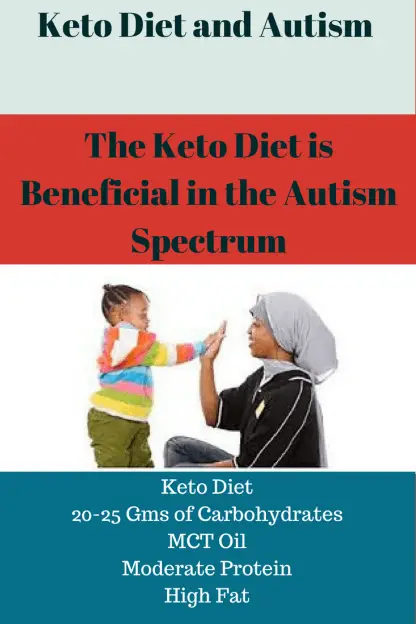The Keto diet has taken the country by a storm! That is because every day we are hearing about all of the benefits of the keto diet. The keto diet has been shown to help children on the autistic spectrum. Autism is a neurodevelopmental disorder. The diet used was a keto, gluten-free diet. In this article, I will discuss the keto diet and autism.
Keto Diet Helps Autism
The autism spectrum is a developmental disorder that affects the behavior, communication, and social skills of the child. The symptoms of autism usually develop in the first two years of the child’s life.
 Signs and Symptoms of Autism
Signs and Symptoms of Autism
- Inconsistent eye contact
- Inattentive to what other people are saying
- Inappropriate behavior
- Unusual facial expressions
- Repetitive or restrictive behaviors
- Sleeping problems
- Excel in math and science
- Irritability
There are medications used for children with autism such as Adderall, Ritalin, and Concerta. However, these medications can have some horrible side effects.
Autism and Dietary Interventions
The Keto diet has been used effectively to treat neurodevelopmental disorders. The ketogenic diet, which is a low-carbohydrate, moderate protein, and a high-fat diet has been shown to treat seizures in children. Therefore, scientists have started to do more research on the keto diet and other neurological diseases.
The Johns Hopkins Center has a Ketogenic Diet Center that is used to treat pediatric epilepsy. The keto diet has been around since the 1920s. Johns Hopkins researchers have used the diet on infants to teenage children with good results.
This book describes how the keto diet helps autism.
How Does the Keto Diet Help Autism Spectrum?
Studies have shown that the ketogenic diet alters brain cellular metabolism through the use of ketone bodies. This is how the keto diet helps autism.
Ketone bodies are produced by the liver from fatty acids and they are used as an energy source when glucose is not available. Ketones are always in the blood, but ketones increase when there is no glucose in the blood to be used for energy.
Keto Gluten-Free Diet for Autism
The modified keto diet consisted of a daily intake of 20-25 grams of net carbohydrates. Protein and fats were based on the child’s weight. Medium-chain triglycerides (MCT) oil such as coconut or pure MCT oil. The MCT oil was included in the daily meals. Gluten restriction was also maintained.
Gluten foods consist of:
- Rye
- Barley
- Malt
- Brewers yeast
- Wheat
- Pasta and noodles
- Baked goods
- pancakes, waffles, cookies, and pies
The Autism Diagnostic Observation Schedule was used to assess the symptoms of autism of the participants. The researchers assessed the behavior of the children at baseline and at 3 months.
Results of the Keto Diet for Children on the Autism Spectrum
All of the children who participated in the study had significant improvements in the majority of the autism features areas after 3 months. Improvements were noted in imitation, body use, fear, and nervousness in the children diagnosed with autism.
This book, A Parents Guide to High Functions Autism Spectrum is a good resource.
Parents reported improvements in interest in other people, eye contact, meaningful language, hyperactivity, and schedule changes.
Side Effects of the Keto Gluten-Free Diet
The most common side effects of the diet were diarrhea, vomiting, dehydration, and hypoglycemia. All of the side effects occurred within the first 2-4 weeks of the diet. The adverse effects of the diet were minimal and they went away after 2-4 weeks on the diet.
There is evidence that autism is related to a dysregulated metabolism, and inflammatory processes. These children also have significantly lower HDL levels.
Researchers are exploring how increasing HDL levels will help autism symptoms. We know that the keto diet increases HDL levels.
High-density lipoproteins (HDL), plays a role in an immune response. The keto diet also produced increased albumin levels. Lower levels of albumin are associated with low levels of HDL. Ketones have been known to block inflammatory processes. This is how the keto diet helps autism.
Conclusions
The keto diet has been shown to help the symptoms of the autism spectrum. The keto diet helps autism by stimulating the brain.
FAQ
Sure, here are some common questions and answers about the ketogenic diet and autism:
1. Q: What is the ketogenic diet?
A: The ketogenic diet is a high-fat, adequate-protein, low-carbohydrate diet that forces the body to burn fats rather than carbohydrates for energy. This changes the way energy is used in the body, leading to ketosis, a state where fat, instead of sugar, is used for energy.
2. Q: What is the potential link between the ketogenic diet and autism?
A: There is some preliminary research that suggests the ketogenic diet may have benefits for some individuals with autism. The proposed mechanisms include reducing inflammation in the brain, improving mitochondrial function, and altering the gut microbiota, which all could potentially impact symptoms of autism. However, this is still a growing area of research, and more studies are needed to fully understand the potential benefits and risks.
3. Q: Is the ketogenic diet safe for children with autism?
A: The ketogenic diet should be started under the supervision of a healthcare provider, as it requires careful monitoring and adjustments. There can be side effects, including nutritional deficiencies and increased risk for other health problems. It’s especially important for children, whose nutritional needs are crucial for growth and development, to follow this diet only under medical supervision.
4. Q: Have there been any scientific studies on the ketogenic diet’s effects on autism?
A: As of my knowledge cutoff in September 2021, there have been several small studies and case reports suggesting potential benefits of the ketogenic diet in autism, but large-scale, high-quality research is lacking. Always refer to the most recent literature or consult with healthcare professionals for the latest information.
5. Q: Can the ketogenic diet cure autism?
A: No, the ketogenic diet cannot cure autism. Autism is a complex neurological and developmental disorder that’s typically lifelong. While some studies suggest that the ketogenic diet may help manage some symptoms of autism, it is not a cure.
6. Q: Does the ketogenic diet improve social skills in children with autism?
A: Research on this topic is limited. Some studies have reported improvements in social behaviors with a ketogenic diet, while others have not. More research is needed to determine the extent of these potential benefits.
My name is Phyllis Robinson MSN, RN. I have been a Registered Nurse for 27 years in the Cardiac Intensive Care Unit. I am passionate about cardiac care and heart disease. I also want this blog to be an educational tool that people can refer to for traditional and alternative treatment. I will blog on heart disorders such as high blood pressure, congestive heart failure, cardiomyopathy, and high cholesterol.
I received my Nursing degree from Baltimore Community College.
I went on to receive my Masters in Nursing from Walden University
I have worked for almost 30 years in Critical Care with a focus on heart health. I am an advocate of preventive healthcare.







What is the rule for figuring your child’s proteins & fats based on their weight? For instance, my son weighs 108 lbs.
Thank you
Hi April, this is a keto calculator that should be helpful.
https://www.ruled.me/keto-calculator/